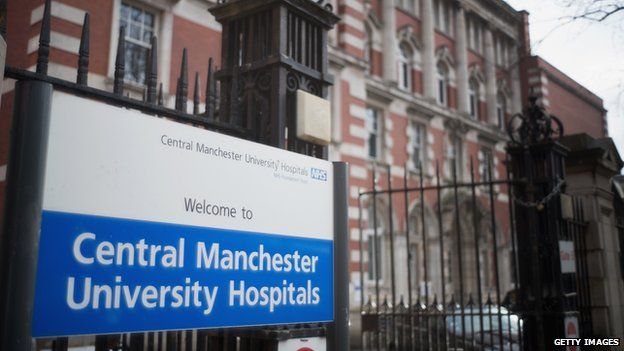Greater Manchester £6bn NHS budget devolution begins in April
- Published

Greater Manchester will begin taking control of its health budget from April after a devolution agreement was signed by the Chancellor George Osborne.
The region's 10 councils and health groups will take over £6bn allocated for health and social care, with full powers being devolved a year later.
Mr Osborne signed the memorandum of understanding, dubbed Devo Manc, for "better, more joined-up health care".
Labour MP Barbara Keeley said: "We're being handed over a funding crisis."
From 1 April, the region will start making its own decisions to "provide the foundations" for a Greater Manchester health and social care strategy.
'No NHS reorganisation'
Manchester City Council said this, along with business and investment proposals, would also give a "transitional plan" for full devolution by April 2016.
People and budgets
£6bn
share for Greater Manchester
-
£98.7bn is the estimated NHS budget for 2015-16 across England
-
2.7 million is the estimated population in Greater Manchester
-
53 million people are estimated to live in England
Mr Osborne said: "We have a landmark agreement to bring the local NHS and social care much more closely together.
"I am excited about all this because not only does it mean the people of Greater Manchester having more control over the decisions that affect their lives, I believe it will also lead to better, much more joined-up health care.
"It's also a historic day for Greater Manchester. They are leading the country in this important change."
The agreement "does not require any reorganisation of the NHS or its principles", the city council said.
Devolution deal
- Greater Manchester takes responsibility for adult, primary and social care
- The region will also control mental health and community services and public health
- It will focus on preventative work in the community such as treating heart conditions by community specialists in a bid to ease pressure on hospitals
- The 10 councils, 12 clinical commissioning groups, 15 NHS providers and NHS England will control the budget and deliver services
- The group will also build strategies around governance, regulation, finances and health education to run the devolved health service
Ms Keeley, MP for Worsley and Eccles South, said: "The problem with Osborne's offer is that it is on existing budgets.
"A&E has just been through its biggest crisis for many many years, so let's be realistic about it.
"There are big gaps in social care, our hospitals are in deficit [and] that's no way to do a proper job of integrating care, which is Labour's policy - to integrate health and social care at the local level."
The agreement is part of the government's northern powerhouse plan to close the economic gap between north and south by investing in regions.
The plan would see local leaders, and ultimately Greater Manchester's new directly elected mayor, control how budgets are allocated.
Deputy leader of Greater Manchester Combined Authority Sir Richard Leese said: "The first big change is to make sure that a lot of people aren't entering into needing healthcare that don't need to do so."
Sir Richard, who is also the leader of Labour-run Manchester City Council, said "people are spending too long in hospital" so "there will proper care packages available" when they return home.
The plan aims to ease the pressure on hospitals in the long-term.
Analysis
Arif Ansari, Political Correspondent, BBC North West Tonight
The chief executive of NHS England Simon Stevens quipped that "we are now signing the nuptials". For some of us, it felt more like a renewal of the vows.
Last November, the chancellor signed the UK's first "devolution deal" - but this may be a bigger deal, as Greater Manchester becomes a testbed for NHS devolution.
But the congregation in the Town Hall may have noticed a lack of Labour MPs - this deal has exposed a division between Labour's local authority leadership and its Westminster team.
The shadow health secretary Andy Burnham, who's long championed integration, called it a "two-tier system" and his colleague, Wigan MP Lisa Nandy, said it showed "complete contempt" for local people.
They believe there's a lack of democratic oversight. They were also politically exposed, unaware this major agreement was being negotiated.
The chief executive of Manchester City Council, Sir Howard Bernstein - perhaps taking the role of Best Man - told me the NHS won't be controlled by any future mayor but by a new health board of council leaders and local NHS managers.
Other council leaders, including the Mayor of Liverpool Joe Anderson, are left wishing they had been invited to a similar ceremony.
Ann Barnes, chief executive of Stockport NHS Foundation Trust, said: "It is not about increasing power, but about increasing the health and prosperity of local people.
"We will have greater opportunities to respond swiftly and effectively to the needs of residents and really transform services for them. They will have a powerful voice in a powerful partnership."
NHS England chief executive Simon Stevens described the memorandum of understanding as a "landmark agreement".
"[It] charts a path to the greatest integration and devolution of care funding since the creation of the NHS in 1948," he said.
"Greater Manchester now has a unique opportunity for innovation and improvement in health and wellbeing. The eyes of the country will now be on what this new partnership can deliver, and today the work begins."
- Published27 February 2015
- Published25 February 2015
- Published25 February 2015
- Published25 February 2015
- Published27 January 2015
- Published3 November 2014
- Published3 November 2014
- Published3 November 2014